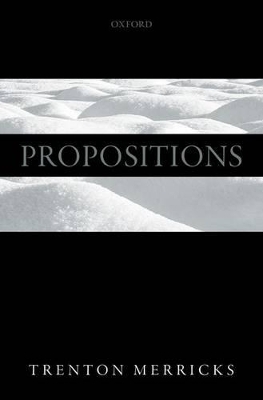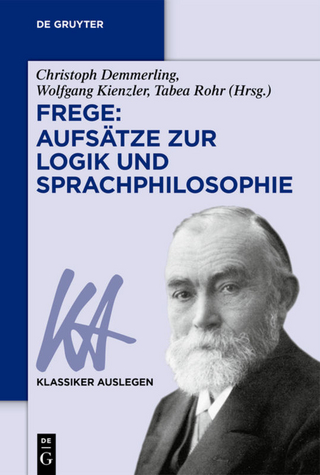
Propositions
Seiten
2015
Oxford University Press (Verlag)
978-0-19-873256-3 (ISBN)
Oxford University Press (Verlag)
978-0-19-873256-3 (ISBN)
Trenton Merricks presents an original argument for the existence of propositions, and defends an account of their nature. He draws a variety of controversial conclusions, for instance about supervaluationism, the nature of possible worlds, truths about non-existent entities, and whether and how logical consequence depends on modal facts.
Propositions has two main goals. The first is to show that there are propositions. The second is to defend an account of their nature. While pursuing these goals, Trenton Merricks draws a variety of controversial conclusions about related issues, including, among others, supervaluationism, the nature of possible worlds, truths about non-existent entities, and whether and how logical consequence depends on modal facts.
An argument is modally valid just in case, necessarily, if its premises are true, then its conclusion is true. Propositions begins with the assumption that some arguments are modally valid. Merricks then argues that the premises and conclusions of modally valid arguments are not sentences. Instead, he argues, they are propositions. So, because there are modally valid arguments, there are propositions.
Merricks defends the claim that propositions are not structured and are not sets of possible worlds. He thereby presents arguments against the two leading accounts of the nature of propositions. Those arguments are intended not only to oppose those accounts, but also to deliver conclusions about what a satisfactory account of the nature of propositions should say. Of particular importance in this regard are arguments concerning the alleged explanations of how a set of possible worlds or a structured proposition would manage to represent thing as being a certain way. Merricks then defends his own account of the nature of propositions, which says only that each proposition is a necessary existent that essentially represents things as being a certain way.
Propositions has two main goals. The first is to show that there are propositions. The second is to defend an account of their nature. While pursuing these goals, Trenton Merricks draws a variety of controversial conclusions about related issues, including, among others, supervaluationism, the nature of possible worlds, truths about non-existent entities, and whether and how logical consequence depends on modal facts.
An argument is modally valid just in case, necessarily, if its premises are true, then its conclusion is true. Propositions begins with the assumption that some arguments are modally valid. Merricks then argues that the premises and conclusions of modally valid arguments are not sentences. Instead, he argues, they are propositions. So, because there are modally valid arguments, there are propositions.
Merricks defends the claim that propositions are not structured and are not sets of possible worlds. He thereby presents arguments against the two leading accounts of the nature of propositions. Those arguments are intended not only to oppose those accounts, but also to deliver conclusions about what a satisfactory account of the nature of propositions should say. Of particular importance in this regard are arguments concerning the alleged explanations of how a set of possible worlds or a structured proposition would manage to represent thing as being a certain way. Merricks then defends his own account of the nature of propositions, which says only that each proposition is a necessary existent that essentially represents things as being a certain way.
Trenton Merricks is Professor of Philosophy at the University of Virginia. He is the author of Objects and Persons (OUP, 2001), Truth and Ontology (OUP, 2007), and many articles in metaphysics, epistemology, philosophy of mind, philosophy of language, and philosophy of religion.
Acknowledgements ; Introduction ; 1. Propositions and Modal Validity ; 2. Logical Validity and Modal Validity ; 3. Propositions Are Not Sets of Possible Worlds ; 4. Against Structured Propositions ; 5. Singular Propositions ; 6. The Nature of Propositions ; References ; Index
| Erscheint lt. Verlag | 7.5.2015 |
|---|---|
| Verlagsort | Oxford |
| Sprache | englisch |
| Maße | 141 x 208 mm |
| Gewicht | 402 g |
| Themenwelt | Geisteswissenschaften ► Philosophie ► Logik |
| Geisteswissenschaften ► Philosophie ► Metaphysik / Ontologie | |
| Geisteswissenschaften ► Philosophie ► Sprachphilosophie | |
| ISBN-10 | 0-19-873256-2 / 0198732562 |
| ISBN-13 | 978-0-19-873256-3 / 9780198732563 |
| Zustand | Neuware |
| Informationen gemäß Produktsicherheitsverordnung (GPSR) | |
| Haben Sie eine Frage zum Produkt? |
Mehr entdecken
aus dem Bereich
aus dem Bereich
ein Gegenentwurf zum kurzfristigen Denken : so werden wir zu den …
Buch | Hardcover (2023)
REDLINE (Verlag)
18,00 €


